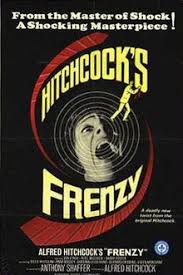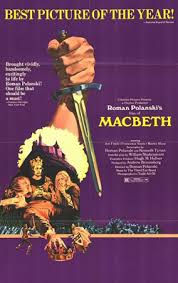
© Goodtimes Enterprises / Anglo-EMI Film Distributors
The film and TV actor Jon Finch died seven-and-a-half years ago. At the time of his passing, late on in 2012, he hadn’t worked for several years and had lived quietly in the English town of Hastings and his death had apparently gone undiscovered for some time. Word of his funeral wasn’t announced until January 2013. For that reason, obituaries for him in the British media were intermittent and patchy. I decided to pen a few words of tribute on this blog and the resulting post seemed to rank high on Google searches about Finch – as I’d said, obituaries for him were intermittent and patchy. Gratifyingly, a number of people who’d known Finch over the years came across my post and left comments on it. In fact it was one of this blog’s most commented-on entries. (And I’m kicking myself that, because this blog had to recently get a post-hacking reboot, those comments from Finch’s friends have now been lost.)
Anyway, I thought I’d revisit, rewrite and update what I originally wrote about Finch in 2013 and repost it. Annoyingly, though, I still haven’t managed to see 1973’s The Final Programme…
Jon Finch began his career in television, went into films and ended up back in television. For a couple of years in the early 1970s, while he was doing film-work, he had the opportunity to become massive, but that didn’t happen. Finch, who valued his privacy and had a low opinion of the celebrity circus, may well have preferred it that way.
He began acting on television in 1964, appearing in ITV’s notoriously dire soap opera Crossroads. In 1970, like many a British TV actor at the time, he got his break in movies thanks to Hammer Films – who were always looking for cheap acting talent to appear in their low-budget but cheerfully sensationalist horror movies. He duly provided vampire-hunting support to Peter Cushing in Roy Ward Baker’s okay The Vampire Lovers and appeared in Jimmy Sangster’s dreadful Horror of Frankenstein. Then Roman Polanski hired him to play the title role in his version of Macbeth, released in 1971, and suddenly Finch’s career trajectory had become exponentially steep.
Polanski’s take on Shakespeare’s Scottish play was bloody, dark and bleak – everything that a good production of Macbeth should be, in my opinion. In this film, what works in favour of Finch as Macbeth, and of his co-star Francesca Annis as Lady Macbeth, is the fact that they’re both so young. The audience therefore feels they have little power over their destiny. Rather, they’re swept to their tragic ends by dark forces both political and supernatural.
Polanski’s Macbeth got an unsympathetic appraisal from many critics, who couldn’t see beyond the film’s high level of violence and who linked it with what Polanski had gone through in August 1969 – when his pregnant wife Sharon Tate and four others were slaughtered at his house in Beverly Hills by acolytes of hippie-cult nutcase Charles Manson. New Yorker critic Pauline Kael even wondered if Polanski’s staging of the murder of Macduff’s family was an attempt to recreate the carnage that Manson had orchestrated. In fact, the film’s screenwriter, celebrated theatre critic Kenneth Tynan, is reputed to have challenged Polanski about the amount of blood displayed in this scene, to which the director retorted, “You should have seen my house last summer.”
From Roman Polanski, Finch moved on to Alfred Hitchcock and landed the lead role in 1972’s Frenzy. Although Frenzy hardly represents Hitchcock at the peak of his artistry, it’s by far and away the best of the director’s last clutch of films, which include Torn Curtain (1966), Topaz (1969) and Family Plot (1976). It also shows Hitchcock at his most disturbing. The murder sequence involving Barbara Leigh-Hunt, who plays Finch’s ex-wife, is the most brutal thing he ever did, and the potato-truck ride (where serial strangler Barry Foster tries to retrieve an incriminating piece of evidence from a corpse he’d concealed earlier inside a huge sack of potatoes) is gruelling too.
Playing an innocent man accused of and hunted down for Foster’s murders, Finch bravely refrains from making his character sympathetic. Indeed, he’s something of a shit and has a violent streak, and for a period at the start of the film we think he really is the strangler. By the time it becomes clear that Foster is actually the culprit, Hitchcock – a master manipulator of his audience’s emotions – has presented him as a chirpy, likeable chap. Thus, we find ourselves siding more with him than we do with Finch.

© Universal Pictures
Having worked with two of the world’s greatest directors, Finch seemed destined for international fame and indeed he was soon offered the chance to replace Sean Connery in the James Bond series. Finch, however, declined and the role went instead to the somewhat less invigorating Roger Moore. Around this time he also turned down the role of Aramis in Richard Lester’s The Three Musketeers (1973) which, tantalisingly, would have seen him acting alongside another actor with a low opinion of movie stars and movie stardom, Oliver Reed.
In fact, in 1973, Finch did play a vaguely James Bond-like character when he took the role of Jerry Cornelius in Robert Fuest’s The Final Programme, which was based on the first of the four Cornelius novels written by Michael Moorcock, set in a surreal, 1960s-esque and science-fiction-tinged world where the fabric of reality is beginning to fray. I’ve never seen The Final Programme, though from all accounts Fuest did a pretty cack-handed job of it. In stills, though, Finch at least looks the part of Moorcock’s enigmatic hipster-cum-secret-agent hero. Moorcock himself disapproved of the film adaptation, although he liked Finch’s performance and paid tribute to him on his website / discussion forum Moorcock’s Miscellany when he heard of his passing: “I was very fond of Jon and was sorry we lost touch… He was genuinely modest.”
Towards the end of the 1970s, Ridley Scott lined Finch up to appear in his ground-breaking sci-fi horror film Alien. Finch was supposed to play Kane, a character who doesn’t last long in the movie’s script but is certainly pivotal to it. He’s the unfortunate crewmember who goes exploring the mysterious crashed spaceship and ends up with an alien egg inside his chest. Two days into filming, however, Finch became too ill to work – either from bronchitis or from complications caused by his recently-diagnosed diabetes, depending on which story you believe – and was replaced by John Hurt. Thus, he missed appearing in the infamous ‘canteen’ scene where Kane expires and the alien makes its first appearance, one of the most (literally) explosive scenes in horror-movie history.
From there on, it was through his television work that Finch remained in the public consciousness. In the late 1970s, he appeared in the BBC Television Shakespeare, a series of adaptations of all the Bard’s plays. Though they were criticised for their staginess and the generally conservative manner in which they were brought to the screen, the adaptations certainly couldn’t be faulted for the top-notch acting they contained. In Richard II (1978), Finch played Henry Bolingbroke to Derek Jacobi’s Richard and John Gielgud’s John of Gaunt. With Bolingbroke elevated to monarch, he then played the title role in the sequels Henry IV Part One and Part Two (1979), with Anthony Quayle as a jovial, red-cheeked Falstaff and David Gwillim as Henry’s offspring, Prince Hal. (In reality, Gwillim was only six years younger than Finch.)
Still picky about his roles, he passed on the opportunity to play Doyle in Brian Clements’ hugely popular espionage / action series The Professionals (1978-81). Ironically, the role eventually went to Martin Shaw, who’d played Banquo to Finch’s Macbeth. On the other hand, out of loyalty to Hammer, he starred in the first episode of the studio’s 1980 anthology series The Hammer House of Horror, in which he played a modern-day composer haunted by a witch who’s popped forward through time from the 17th century (a role performed with memorable relish by Patricia Quinn). And for a quarter century he gave guest turns in popular shows like The New Avengers, The Bill, Maigret, New Tricks and The Memoirs of Sherlock Holmes.
Frustratingly, Finch’s role in a 1994 episode of Sherlock Holmes, a combined adaptation of two of Sir Arthur Conan Doyle’s short stories The Adventure of the Mazarin Stone and The Adventure of the Three Garridebs, didn’t see him appear alongside Jeremy Brett, the actor widely regarded as the screen’s best-ever Holmes – Brett had to be written out of most of the episode due to health problems. However, as a villain, Finch did get to face up to the almost-as-good Charles Gray, playing Sherlock’s brother Mycroft.
Finch’s final appearance was a film one, in Ridley Scott’s 2005 crusades epic Kingdom of Heaven, so at least he got to work with that director nearly three decades after his gig in Alien fell through. Thereafter, he kept a low profile in Hastings, in declining health but seen now and again in some of the local public bars. I wonder if the regulars in those Hastings pubs were aware that old ‘Finchy’, as he was known, had once headlined films directed by Hitchcock and Polanski and had come within a whisker of being 007.

© Playboy Productions / Columbia Productions
